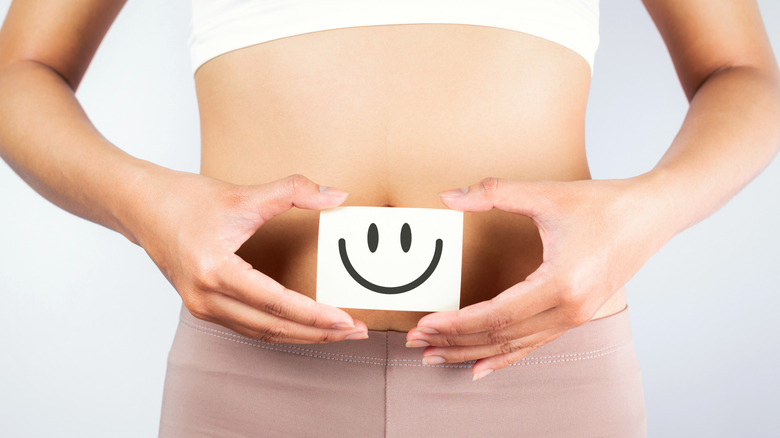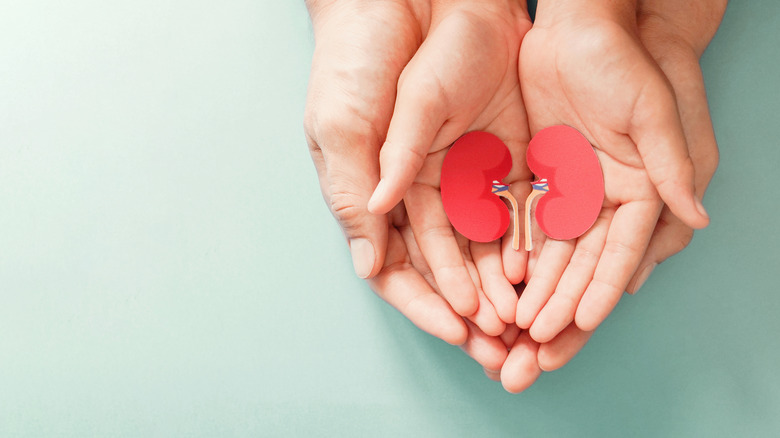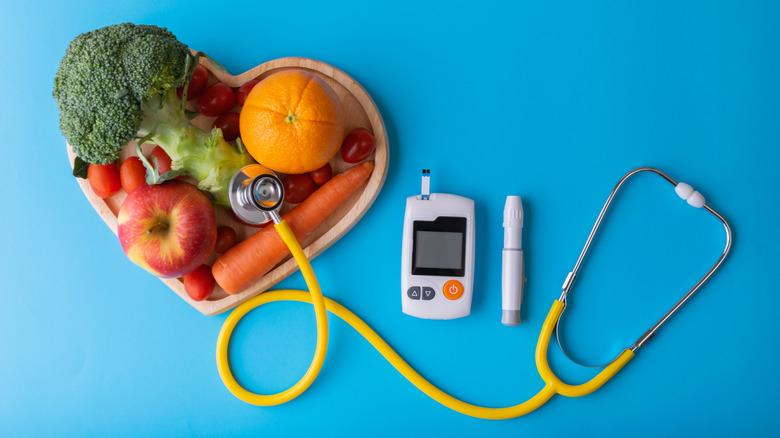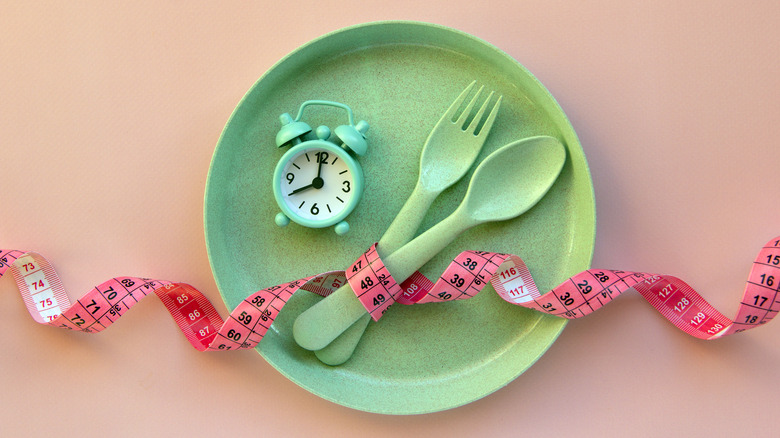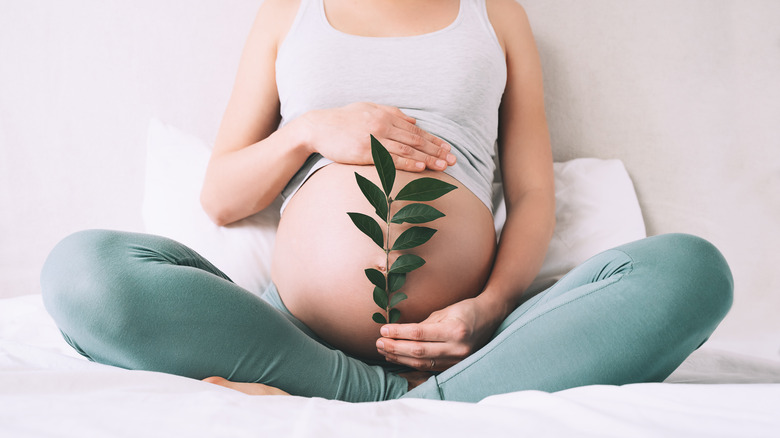The Keto Diet May Be More Dangerous Than You Thought
Never has there been a hotter debate than the one over the keto diet. Also known as the ketogenic or low-carb diet, this weight loss wonder has taken the world by storm. However, this diet was never intended for the average person when it was created. Rachel Kleinman, RDN, LDN, told UChicago Medicine that keto was initially utilized to help treat epilepsy in children.
The keto diet leads to weight loss because it tricks your body into ketosis — a state in which it starts burning fat (ketones produced by the liver) for energy instead of carbohydrates. While this might sound like a miracle fix, dieticians warn that all is not what it seems. Registered dietician Kathy McManus told Harvard Health that keto's short-term results have been studied, but they have no idea if the diet works in the long term or if it's even safe. Since foods high in carbohydrates are a no-no, most fruits and vegetables aren't allowed on this diet, while foods high in saturated fat are often encouraged. The diet is also hard to maintain because it's so restrictive, and according to McManus, you'll likely regain all the weight you lost once you switch back to a normal diet.
From the various health risks associated with keto to the dangers it can pose if you already suffer from a chronic disease, here's why the keto diet may be more dangerous than you thought.
Following the keto diet could lead to nutrient deficiencies
The keto diet might be pretty good at helping you lose weight, but the limited amount of foods you're allowed to eat might cause serious nutrient deficiencies.
According to Healthline, the keto diet restricts various foods that provide vital nutrients and vitamins to the body, like legumes, whole grains, and fruits. A study published in Epilepsia found that followers of the keto diet tend to develop magnesium, phosphorous, and vitamin D deficiencies. Another study published in the Journal of the International Society of Sports Nutrition looked at the Atkins diet, which is also low-carb like keto, and found that people who follow it tend to only get 12 of the 27 vitamins and minerals their body needs. This could lead to dangerous nutrient deficiencies.
A study published in the Journal of the Academy of Nutrition and Dietetics (via the Paleo Foundation) concluded that those following a keto diet need to take the necessary supplements to ensure their body stays healthy while following the diet. It also recommends keto dieters aim to eat foods that are rich in vitamins. Remember, it's always best to discuss the best supplements to take on this diet with your doctor.
You might develop the dreaded keto flu
If you've ever considered the keto diet, you've probably heard of the keto flu. This dreaded condition develops because your body kind of goes into a bit of a shock when you suddenly take away its carbohydrate supply. "Suddenly and drastically reducing carbohydrates sets your body up for a double whammy of sorts," registered dietician Kim Yawitz told Everyday Health. She explained that our brains prefer to use glucose as fuel, which it gets from carbohydrates. When you go on the keto diet, that supply diminishes and the brain needs to go through an adjustment period where it starts using the ketones produced from digested fat for energy.
This shock will reverberate throughout your entire body. First, your insulin levels will drop and your kidneys will release more electrolytes as a result. Then, your body starts losing water, and the result is the keto flu.
Common symptoms of the keto flu include gut issues like cramps and constipation as well as headaches, nausea, and feeling tired and irritated. Yawitz said that these symptoms typically go away within a few days or a few weeks, but if they persist, you'll need to visit your doctor.
The keto diet could seriously mess with your gut
Gut health is all the rage these days, and if you've ever been concerned about your gut health or experienced any gut issues, you might want to stay away from the keto diet. At least, that's what board-certified physician in internal medicine and gastroenterology, Will Bulsiewicz says. "I get very frustrated when I see claims on the internet that the keto diet is good for your gut health," he told EatingWell. "There's not one single study to support that. In fact, the studies that exist suggest that keto decimates the gut."
The reason keto is bad for your gut is that it cuts out a lot of the foods that are vital to your gut health. Many fruits, vegetables, and whole grains that are not allowed on the keto diet because of their carbohydrate content are the very foods your gut microbiome needs to function optimally, according to Bulsiewicz. He added that you could be setting yourself up for chronic gut conditions with the keto diet, explaining that "you may not have IBS (irritable bowel syndrome) yet, but you're already laying the foundation for it." He also cautions that the restrictions the keto diet requires cause the amount of plant-based foods you can eat to diminish significantly, which means you won't be eating a variety. This, in turn, decreases the variety of gut bugs living in your microbiome, which causes diseases like IBS, inflammatory bowel disease, Crohn's disease, and ulcerative colitis.
The keto diet could put you at risk for heart disease
The keto diet might be good for some things, but heart health might not be one of them. Various studies have been conducted on the effect low-carb diets — such as keto — have on overall heart health. A 2010 study published in Annals of Internal Medicine found that incorporating more plant-based foods into a diet like keto could result in slightly better heart health. However, eating more animal products on the keto diet could put people at a higher risk of heart disease.
A second study, published in Lancet Public Health in 2018, stated that neither plant-based nor animal-based low-carb diets were good for heart health.
Neal Barnard, one of the authors of a 2021 study published in Frontiers in Nutrition that focuses on the long-term effects of the keto diet, told Everyday Health that they concluded the risks outweigh the benefits. The study review found that the keto diet actually commonly raises LDL aka "bad" cholesterol levels in the body. In fact, one of the studies cited in the review that looked at the diet's effect on cholesterol levels over the course of six months found that 30 percent of the participants had their LDL cholesterol levels raised by more than 10 percent. This is definitely an important side effect to keep in mind if you consider going on the keto diet.
The keto diet can be bad for your kidneys
Low-carb diets like keto incorporate plenty of animal products that are high in fat because they fit the "no carbs" criteria. This includes meat, cheese, and eggs. While that might seem like a pretty "fun" diet for most, this way of eating can actually be damaging to your kidneys and can even cause kidney stones, according to Healthline.
If you're someone who is prone to kidney stones or suffers from chronic kidney disease, you might want to stay far away from the keto diet. A 2010 study published in the Yonsei Medical Journal found that thanks to the large number of animal products typically consumed on the keto diet, people's blood tends to turn more acidic, as does their urine. This, in turn, causes more calcium to be released into the urine. The same study concluded that, along with higher calcium levels, keto also lowers the urine's citrate levels. Citrates are essential to prevent kidney stones because it binds to calcium. Even if your kidneys are healthy, the keto diet will place a lot of stress on them, and you might have to deal with kidney stones or worsen CKD if you already suffer from it. WebMD also warns that the keto diet can be pretty hard on the liver.
The keto diet might cause dangerously low blood sugar levels
The keto diet has been utilized to help people manage their blood sugar levels, but it can also cause dangerously low blood sugar. A study published in Diabetic Medicine (via Healthline) looked at the effect of the keto diet on adults with Type 1 diabetes over the course of two years. The participants experienced dangerously low blood sugar levels (hypoglycemia) almost daily.
According to Healthline, not consuming an efficient amount of carbs tend to be the main cause of low blood sugar levels in individuals who suffer from Type 1 diabetes. Those with type 2 diabetes can find themselves in a similar situation if they use insulin medications. In both these cases, the keto diet could make things worse instead of better. Some have touted it as a means to help lower blood sugar levels in individuals with type 2 diabetes, but a 2015 study published in Diabetes Therapy concluded that low-carb diets should only be used as a short-term treatment and that it shouldn't be utilized as a primary treatment for type 2 diabetes. Jo-Anne Rizzotto, RD, told Livestrong that diabetic patients need to consult with their doctor first before ever jumping on the keto bandwagon, especially if they already use insulin.
The keto diet can have a negative impact on bone health and muscle mass
A 2017 study published in Epilepsy Research looked specifically at 29 children following the keto diet to improve their epilepsy symptoms. At the end of the six-month trial, 68% displayed lower bone density levels. A 2020 study published in Frontiers in Endocrinology compared the bone density of elite walkers who followed the keto diet to those who followed a higher-carb diet. The keto dieters displayed higher levels of bone breakdown than those eating a higher-carb diet.
The keto diet can also cause muscle loss, especially in older individuals, Carla Prado, an associate professor of nutrition at the University of Alberta in Edmonton, told AARP. She explained that those on a keto diet often don't consume enough protein to maintain their muscle mass, let alone build more of it. The keto diet only allows 15 percent of calories to come from protein, and older people especially need more protein than younger individuals to maintain and build muscle. Speaking to Everyday Health, Edwina Clark, RD, said that some studies show that people who follow the keto diet lose muscle mass even if they continue their resistance training regimen. Prado says that trading muscle mass for a lean physique simply isn't worth it.
Your period can be affected by the keto diet
The keto diet affects every part of your body, including your hormones.
A 2003 study published in Epilepsia found that the keto diet is effective at treating epilepsy and causes menstrual dysfunction. This study, in particular, saw that the diet affected 45 percent of its female participants' menstrual cycle. Another 2018 study published in the Journal of Obesity and Weight Loss Therapy found that the keto diet was responsible for hormonal disruptions in females.
Board-certified cardiologist and nutritionist Luiza Petre, MD, told Everyday Health that one of the main hormones affected by diets like keto and the resulting weight loss is estrogen. Estrogen is the hormone that ensures your menstrual cycle stays on track, but once you lose a lot of weight, your estrogen levels drop as well, resulting in an irregular or absent cycle.
A 2012 study published in Breast Cancer Research noted that weight loss due to calorie restriction and/or excessive exercise can lead to a drop in estrogen levels and, in turn, issues with your period. John Thoppil, MD, also cautions that lower estrogen levels can affect more than just your period — you might experience other side effects like vaginal dryness. Another problematic side effect is an increased risk of bone loss. Along with that, your fertility can also be affected, so if getting pregnant is something you're aiming for, the keto diet is not the route you want to take.
You might be setting yourself up for yo-yo dieting
If you've ever been caught in a yo-yo diet cycle, you know it's not fun and can be incredibly hard to break.
Ashley Solomon, MD, told Popsugar that diets like keto aren't effective in the long run and tend to lead to yo-yo dieting. "Diets such as keto and Whole30 can trigger dangerous restriction habits, create a setup for binge-eating, and send obsessive food thoughts spiraling," she warned. She added that these diets end up making people feel like they're a failure for not being able to follow through when in reality, a restrictive diet was never the answer to long-term health and weight loss.
Because keto requires people to cut some foods out of their meals completely, they start to see specific foods as bad and, in turn, begin to fear them. "Depriving our bodies of a variety of food experiences and nutrients will have our brains crying. For people at risk for eating disorders, this can be a recipe for disaster," Solomon said, adding that most restrictive diets like keto admit to causing cravings, which can trigger binge eating.
Solomon says that incorporating healthy eating habits to ensure your long-term health has been proven to work better than any restrictive diet, and added, "For those without specific medical conditions, enjoying a variety of foods and having food freedom rather than elimination is the key."
The keto diet can increase your risk of chronic illness
A 2020 study published in the American Journal of Medicine found that the keto diet is detrimental to long-term heart health. The study also concluded that the diet isn't sustainable for maintaining weight loss. In addition, it found that, since people aren't able to stay on the diet, the short-term benefits are outweighed by the long-term consequences, like the eventual weight gain and higher cholesterol levels that follow as a result. Mary Condon, RN, LDN, told UChicago Medicine that keto is a quick fix, and most of the time, people end up gaining back all the weight they lost, and then some. In short, risking your long-term health for temporary weight loss might not be worth it, and the chronic conditions associated with keto are scary.
A 2010 study published in Annals of Internal Medicine found a link between low-carb diets like keto and cancer. Researchers believe this is likely because diets like keto heavily rely on foods like red and processed meat and foods high in saturated fat.
Another 2018 study published by the European Society of Cardiology concluded that low-carb diets like keto isn't safe for long-term health and can cause early death. According to study author Maciej Banach, a professor at the Medical University of Lodz in Poland, keto puts people at risk of stroke, heart disease, and cancer.
The keto diet could be dangerous if you're pregnant
According to WebMD, there are risks associated with following the keto diet while pregnant. Nutrient deficiency is the biggest one.
Pregnant women must follow a healthy diet to ensure the fetus develops well. If you follow the keto diet, you might lack essential nutrients like folic acid, which is responsible for developing the fetus' brain and spine. Folic acid is found in foods rich in carbohydrates, like enriched bread, beans, and fortified cereal – all things the keto diet requires you to eliminate. Since the keto diet is high in fat, it can also lead to weight gain and high blood pressure during pregnancy. WebMD also advises that women don't follow the keto diet when they're trying to get pregnant or while they're lactating.
There are limited studies that look at the keto diet's effect on unborn babies since such experimentation is frowned upon (per Healthline), but animal studies have found frightening results. For example, a 2013 study published in BMC Pregnancy and Childbirth found that pregnant mice on a keto diet had babies with smaller brains and larger hearts than normal. Another 2015 study published in Brain and Behavior found baby mice whose mother was on the keto diet while pregnant had a higher risk of developing psychological issues like depression and anxiety when they reach adulthood.
All things considered, it would be best to steer clear of the keto diet if you're pregnant.



